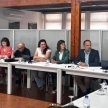Lusa - Business News - Portugal: Students suggest using waste wool as insulation for refugee camps
Miranda do Douro, Portugal, Jan. 17, 2025 (Lusa) - The use of Mirandese sheep's wool for thermal insulation in refugee camp shelters is one of the projects at the Bragança Polytechnic Institute's Innovation and Challenges Week, which ends in Miranda do Douro on Friday.
Carlismar Guedes, a zootechnical engineering student from Brazil, presented this work, which is based on utilising the wool of Churra Mirandesa sheep, a species of sheep native to the region, to be used as a natural insulator in shelters for refugees or displaced persons in disaster or war zones.
"We're developing solutions for utilising sheep's wool to bring innovation to the lack of utilisation of this product, which has no commercial interest but great potential. Sheep's wool remains as waste and is discarded. We therefore propose alternative solutions for its use as an insulating material for shelters for displaced people, as it is easy to transport," this student from the Bragança School of Agriculture explained.
According to the student, sheep's wool is organic and can also be used as an acoustic insulator, but the humanitarian aspect stands out the most.
"Since displaced people and refugees are placed in tarpaulin tents, sheep's wool can be used as a thermal insulator and can even be flown to more remote or hard-to-reach regions, giving people more comfort. What is currently a waste becomes a humanitarian responsibility," emphasised Carlismar Guedes.
The technical secretary of the Churra Mirandesa Sheep Association, Andrea Cortinhas, was attentive and praised the interest in giving a destination to a product that is being ignored because there is no outlet and which often has to be buried, rendering agricultural land useless.
"This is an innovative project that could have a future. In this project, the wool is used naturally, without treatment or washing, which is the most expensive part," she said.
Another of the proposals presented came from Jesualdo Dinis' group, a student from Angola who presented a project in the area of new technologies that aims to put them at the service of this region in the interior of the country as a means of publicising it on various channels, such as social media or short videos.
"From what I've seen, this region needs more publicity and promotion through new technologies to showcase its potential. This region lacks information, which is important for attracting new residents," explained the student from the School of Technology and Management.
Purnata Khakurel, a native of Nepal studying at IPB, also devoted his research to the Mirandese donkey and the challenges facing the preservation of this indigenous breed, which was once threatened with extinction.
"We are creating therapeutic programmes for the elderly using the Mirandese donkey, but these can be extended to other people with pathologies that require asynotherapy," said the Nepalese student.
These projects are examples of the work of 19 IPB students from various parts of the world, who came together in Miranda do Douro searching for solutions for the sustainable development of the Mirandese Plateau, ranging from livestock farming to culture and language.
Over a week, the students from all of the IPB's schools, together with 14 teachers from Portugal, Spain and Brazil, worked at the Malhadas Zootechnical Post and travelled through various villages in the north-east of Trás-os-Montes in search of answers and solutions for harnessing and publicising the full potential of this border region.
This work camp was based on challenge-based innovation projects, bringing together multidisciplinary teams made up of students, teachers and companies who have been working on innovative solutions to concrete challenges identified by associations in the Mirandese region.
Vanessa Troncho, a lecturer at a business school in Barcelona, Spain, said that we need to invest in the strong values of the peninsula's interior, such as Terra de Miranda.
"This is an area with a good quality of life, but we need to work to attract talent from outside and also to stimulate the talent that exists in this region, so it will be important to work on the values of this area," she emphasised.
Paulo Meirinhos, a musician and member of the Galandum Galundaina Association,said this type of action is essential to bring innovation to Mirandese culture and thus not be isolated in one's own ideas.
"It's important to get to know other realities, and these kinds of activities are essential because there are people with experiences in other parts of the world, and so there can be a comparison with what is being developed here," he emphasised.
Vera Ferro, the IPB's vice-president in the area of Entrepreneurship and Educational Innovation, noted that this initiative, which is called Challenge-Based Innovation, creates real challenges that are being experienced this semester by institutions from Terra de Miranda (the municipalities of Miranda do Douro, Mogadouro and Vimioso).
"Here we had cultural challenges, others that were more technological and creative. We've put the students to work with local institutions in the field, looking for creative products that don't yet exist on the market," she said.
FYP/ADB // ADB.
Lusa






